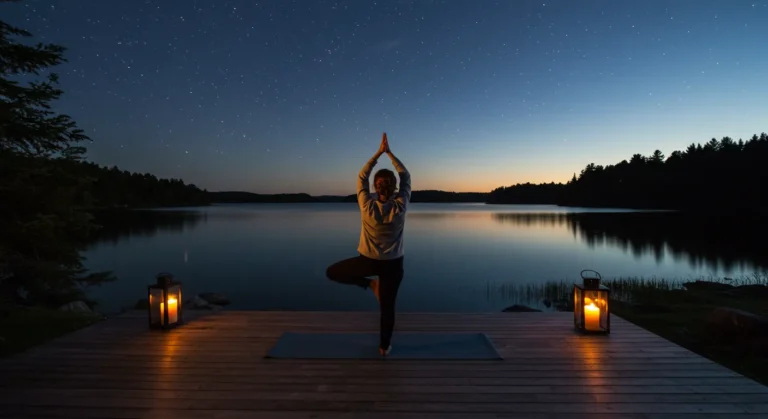Sleep Hygiene Routine: Your Key to Better Sleep, More Energy, and a Calmer Mind

Let me guess—it’s 2 AM, you’re staring at the ceiling again, and your brain has decided this is the perfect time to replay every awkward conversation from the past decade. At the same time, you’ve got that early meeting tomorrow, and you know you’re going to feel like a zombie shuffling through another day.
You’ve been there too, huh?
Here’s what nobody tells you about those sleepless nights: you’re probably not broken, insomniac, or cursed with “bad sleep genes.” Most of the time, you’re just stuck in a cycle of habits that are actively working against your natural sleep drive.
The real kicker? Poor sleep isn’t some unsolvable mystery. It usually comes down to something called sleep hygiene—and no, that doesn’t mean brushing your teeth before bed (though that helps too).
I’m going to walk you through building a sleep hygiene routine that actually works in real life. No perfect Instagram bedroom setups required, no expensive gadgets that promise miracles. Just practical, science-backed strategies that help you fall asleep faster, sleep deeper, and wake up feeling like a human being again.
What Is Sleep Hygiene (And Why Everyone Gets It Wrong)
Think of sleep hygiene as the foundation of good sleep—like having a clean kitchen makes cooking easier, having clean sleep habits makes sleeping easier.
But here’s where most people mess up: they think sleep hygiene is just about having the perfect bedroom setup. While the environment matters, it’s really about creating consistent patterns that train your brain to recognize when it’s time to shut down.
Your circadian rhythm (that internal clock everyone talks about) is basically like having a really organized personal assistant living in your brain. When you give it clear, consistent signals, it knows exactly when to release melatonin, lower your body temperature, and prep you for sleep.
When you don’t? Well, that’s when you end up wide awake at midnight wondering why your body won’t cooperate.
Poor sleep hygiene usually looks something like this:
- Scrolling TikTok in bed until your eyes burn
- Eating a full meal at 10 PM and wondering why you feel wired
- Going to bed at 9 PM one night and 2 AM the next
- Trying to sleep in what basically amounts to a nightclub (bright, noisy, too warm)
Good sleep hygiene habits look more like:
- Having a consistent bedtime that you actually stick to
- Creating gentle rituals that signal “sleepy time” to your nervous system
- Making your bedroom feel like a sleep sanctuary instead of a multipurpose room
- Giving your brain time to transition from “go mode” to “rest mode”
You don’t need some miracle supplement or $300 weighted blanket. You just need a consistent pattern that teaches your brain: hey, it’s time to rest now.
A Sleep Hygiene Routine That Works for real
Let’s get practical. Here’s a sleep routine that’s designed for actual humans with jobs, stress, and lives that don’t always go according to plan.
Step 1: Lock Down Your Sleep Schedule (Yes, Even on Weekends)
I know, I know—weekend sleep-ins feel like a basic human right. But here’s the thing: your circadian rhythm doesn’t have a weekend mode.
Pick a bedtime and wake time, then stick to them religiously. Even if you stayed up late, still wake up at your regular time. You’ll be tired that day, but you’ll sleep better the next night. It’s like training a puppy—consistency is everything.
Pro tip: Set a “wind down” alarm for 60 minutes before your target bedtime. Treat it like an appointment you can’t reschedule.
Step 2: Create Your Personal Wind-Down Ritual
Your brain needs a clear transition between “daytime brain” and “sleepy brain.” This is where bedtime rituals become your secret weapon.
Pick 2-3 activities that feel genuinely relaxing to you:
Gentle movement works wonders. Try some yoga poses for sleep—nothing intense, just some easy stretches to release the day’s tension. Child’s pose, legs up the wall, or simple spinal twists can work magic.
Breathing exercises for sleep anxiety are surprisingly powerful. The 4-7-8 technique (inhale 4, hold 7, exhale 8) activates your parasympathetic nervous system—basically your body’s “chill out” button.
Sleep meditation or journaling helps quiet that mental chatter. Even five minutes of brain-dumping onto paper can clear the mental clutter that keeps you awake.
The key is doing the same things in the same order every night. Your brain loves patterns, and this routine becomes a powerful sleep cue.
Step 3: Turn Your Bedroom Into a Sleep Cave
Light is melatonin’s worst enemy. Even small amounts can mess with your natural sleep hormones.
Blackout curtains are worth the investment, but if that’s not in the budget, a good sleep mask works too. Your bedroom should be so dark you can’t see your hand in front of your face.
Blue light from screens is particularly evil because it mimics daylight. Either ditch screens completely for the hour before bed, or grab some blue light blocking glasses. Your melatonin production will thank you.
White noise or calming sleep music can mask disruptive sounds. Even if you think you sleep through noise, your brain is still processing it all night long.
Step 4: Make Technology Work for You (Instead of Against You)
Here’s where most sleep hygiene tips get preachy about going completely screen-free. Look, I get it—sometimes you need to decompress with a show or catch up on texts.
The compromise? No screens in the bedroom. Keep your phone charging in another room, or at least across the room so you have to physically get up to check it.
If you must use devices, use night mode, blue light filters, or those goofy-looking blue light glasses. And absolutely no scrolling social media—that stuff is designed to keep your brain engaged and alert.
Swap the doomscrolling for:
- Actually reading a physical book (nothing too thrilling)
- Self hypnosis for sleep or guided meditations
- Gentle podcasts with calm voices talking about boring topics
Step 5: Natural Sleep Support That Actually Works
You don’t need to raid the supplement aisle, but a few natural remedies for deep sleep can give you that extra nudge toward sleepiness.
Herbal tea becomes your evening sidekick. Chamomile is the classic choice, but passionflower, valerian root, and lemon balm all have calming properties. The ritual of making and sipping warm tea is just as important as the herbs themselves.
Essential oils for sleep like lavender can be surprisingly effective. A few drops on your pillow or in a diffuser creates a scent association with bedtime.
Magnesium supplements (specifically magnesium glycinate) can help calm your nervous system without making you feel drugged.
Step 6: The “Can’t Sleep” Game Plan
Sometimes, despite your best efforts, sleep just won’t come. Here’s what to do when you’re lying there thinking “I can’t sleep” for the hundredth time:
Don’t force it. If you’ve been lying there for 20 minutes getting increasingly frustrated, get up. Go to another room and do something genuinely boring in dim light until you feel sleepy again.
Avoid the anxiety spiral. Don’t start calculating how many hours of sleep you’ll get if you fall asleep “right now.” That’s just adding pressure to an already tense situation.
Try progressive muscle relaxation. Tense and release each muscle group from your toes to your head. It gives your anxious brain something to focus on while releasing physical tension.
When You Need Extra Support
Sometimes healthy sleep habits aren’t enough on their own, and that’s completely normal. Here are some tools that can help without breaking the bank or turning your bedroom into a tech laboratory.
Sleep Supplements That Don’t Suck
L-theanine promotes relaxation without drowsiness—great for anxiety that keeps you wired at bedtime.
Melatonin can help reset your sleep schedule, but use it strategically. It’s not a long-term solution, and timing matters more than dosage.
Always check with your doctor before adding supplements, especially if you take other medications.
Sleep Tracking That’s Actually Useful
Sleep tracking can give you insights into your patterns, but don’t become obsessed with the data. Use it to spot trends, not to stress about “perfect” sleep scores.
Fitbit, Oura Ring, or even your phone’s sleep tracking can help you see which habits actually improve your sleep quality.
Light Therapy for Circadian Rhythm Reset
If you’re consistently waking up groggy or your sleep schedule is completely backwards, circadian rhythm light therapy might help.
A sunrise alarm clock gradually increases light to wake you more naturally, while bright light exposure in the morning can help reset your internal clock.
The Truth About Rest
Here’s something our hustle-obsessed culture doesn’t want you to know: rest is productive. Sleep isn’t something you do when you’ve finished everything else—it’s the foundation that makes everything else possible.
When you prioritize sleep and treat it with the same care as your work or fitness routine, everything improves. Your focus sharpens, your mood stabilizes, your immune system works better, and you stop feeling like you’re constantly running on fumes.
If you’ve been googling “how to fix sleep schedule” or “what to do when you can’t sleep” at 3 AM, this is your sign to start with the basics. A consistent, realistic sleep hygiene routine is the most powerful tool you already have—you just need to use it.
Start tonight. Pick one or two habits that feel manageable and build from there. Your future well-rested self will thank you for taking that first step.
And remember: perfect sleep hygiene doesn’t exist. Life happens, schedules get disrupted, and sometimes you’ll break your own rules. The goal isn’t perfection—it’s progress and consistency over time.
If you want to truly unlock your brain’s potential, discover the power of rest in our Ultimate Guide to Deep Sleep.
Disclaimer: The information provided is for educational purposes only, not a substitute for professional medical advice. Always consult a healthcare professional.







